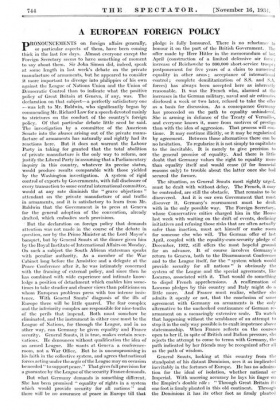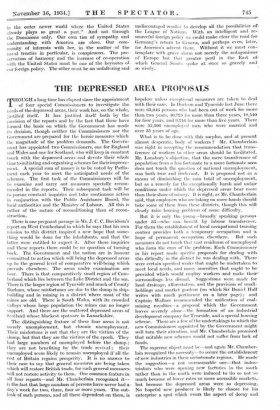A EUROPEAN FOREIGN POLICY
PRONOUNCEMENTS on foreign affairs generally, or particular aspects of them, have been coming thick in the last few days. Almost everyone except the Foreign Secretary seems to have something of moment to say about them. Sir John Simon did, indeed, speak at some length in last week's debate on the private manufacture of armaments, but he appeared to consider it more important to diverge into philippics of his own against the League of Nations Union and the Union of Democratic Control than to indicate what the positive policy of Great Britain at Geneva, if any, was. The declaration on that subject—a perfectly satisfactory one —was left to Mr. Baldwin, who significantly began by commending Mr. Richard Law for a speech devoted mainly to strictures on the conduct of the country's foreign policy. Of that particular debate little need be said. The investigation by a conunittee of the American Senate into the abuses arising out of the private manu- facture of armaments has naturally and rightly had its reactions here. But it does not warrant the Labour Party in taking for granted that the total abolition of private manufacture is the only way to reform, nor justify the Liberal Party in-assurhing that a Parliamentary inquiry in this country, whatever its precise status, would produce results comparable with those yielded by the Washington investigation. A system of rigid control of exports by Governments, with full disclosure of every transaction to some central international committee, would at any rate diminish the " grave objections " attendant on the private manufacture of and traffic- in armaments, and it is satisfactory to learn from Mr. Baldwin that the Government is to press at Geneva for the general adoption of the convention, already drafted, which embodies such provisions.
• But the declaration on foreign policy that demands attention was not made in the course of the debate in question, nor by the Prime Minister at the Lord Mayor's banquet, but by General Smuts at the dinner given him by the Royal Institute of International Affairs on Monday. On such a subject the South African statesman speaks with peculiar authority. As a member of the War Cabinet long before the Armistice and a delegate at the Peace Conference after it, he was intimately concerned with the framing of external policy, and since then he has combined with wide experience and intimate know- ledge a position of detachment which enables him some- times to take steadier and clearer views than politicians on whom European problems press with too intense insis- tence. With General Smuts' diagnosis of the ills of Europe there will be little quarrel. The fear complex and the inferiority complex are responsible for nine-tenths of the perils that impend. Both must somehow be eliminated, and the instrument in either case must be the League of Nations, for through the League, and in no other way, can Germany be given equality and France security. General Smuts, it is true, makes certain reser- vations. He denounces without qualification the idea of an armed League. He wants at Geneva a conference- room, not a War Office. But he is uncompromising in his faith in the collective system, and agrees that national forces acting under the aegis of the League may on occasion be needed " to support peace." That gives full provision for a guarantee by the League of the security France demands.
But what Germany demands is something different. She has been promised " equality of rights in a system which would provide security for all nations " and there will be no assurance of peace in Europe till that pledge is fully honoured. There is no reluctance to honour it on the part of the British Government. The offer made by Herr Hitler in the memorandum of last April (construction of a limited defensive air force ; increase of Reichswehr to 300,000 short-service troops ; postponement for five years of a claim to numerical equality in other arms ; acceptance of international control ; complete demilitarization of S.S. and S.A. forces) has always been accepted here as inherently reasonable. It was the French who, alarmed at the increases in the German military, naval and air estimates disclosed a week or two later, refused to take the offer as a basis for discussion. As a consequence Germany has proceeded on the path to equality unhindered. She is arming in defiance of the Treaty of Versailles, and everyone knows it, more from motives of prestige than with the idea of aggression. That process will con- tinue. It may continue illicitly, or it may be regularized by agreement. Between those alternatives there can be no hesitation. To regularize it is not simply to capitulate to the inevitable. It is merely to give precision to the general promise of equality. And there is little doubt that Germany values the right to equality more than equality itself and would cease (if for financial reasons only) to trouble about the latter once she had secured the former.
The situation, as General Smuts most rightly urged, must be dealt with without delay. The French, it may be contended, are still the obstacle. That remains to be discovered. And it is our own Government that must discover it. Germany's rearmament must be dealt with in the only possible way. The Foreign Secretary, whose Conservative critics charged him in the House last week with waiting on the drift of events, declining initiatives and refusing those risks that are often actually safer than inaction, must act himself or make room for someone else who will. The German offer of last April, coupled with the equality-cum-security pledge of December, 1932, still offers the most hopeful ground for an advance. It of course involves Germany's return to Geneva, both to the Disarmament Conference and to the League itself, for the " system which would provide security for all nations " is obviously the system of the League and the special agreements, like Locarno, associated with it. That would do something to dispel French apprehensions. A reaffirmation of Locarno pledges by this country and Italy might do a little more. And France must realize, whether she admits it openly or not, that the conclusion of some agreement with Germany on armaments is the only alternative to the unchecked continuance of German re- armament on a menacingly extensive scale. To watch that happening without the semblance of an attempt to stop it in the only way possible is to exalt impotence above statesmanship. When France reflects on the courses open to her if, in spite of British and Italian pressure, she rejects the attempt to come to terms with Germany, the path indicated by her friends may be recognized after all as the path of wisdom.
General Smuts, looking at this country from the standpoint of his distant Dominion, sees it as implicated inevitably in the fortunes of Europe. He has no admira- tion for the ideal of isolation, whether national or Imperial. With unerring accuracy he lays his finger on the Empire's double role : " Through Great Britain its one foot is firmly planted in this old continent. Through the Donainions it has its other foot as firmly planted in the outer newer world where the United States already plays so great a. part.", And not_ through the Dominions only. Our own ties of sympathy and understanding with America are close. Our com- munity of interests with her, in . the matter of the naval treaties in particular, is conspicuous. The pre- servation of harmony and the increase of co-operation: with the United-States must be one of the keynotes of: our foreign.policy. Theother must be an unfaltering and undiscouraged resolve to develop all the possibilities of• the League of Nations. With an intelligent and re- sourceful foreign policy we could make clear the road fore Germany's return to Geneva, and perhaps even, later, for America's advent there. Without it we must con-, template with grave alarm not merely, the antagonisms, of Europe but that greater peril in the East of which General Smuts spoke at once so gravely and so wisely.







































 Previous page
Previous page